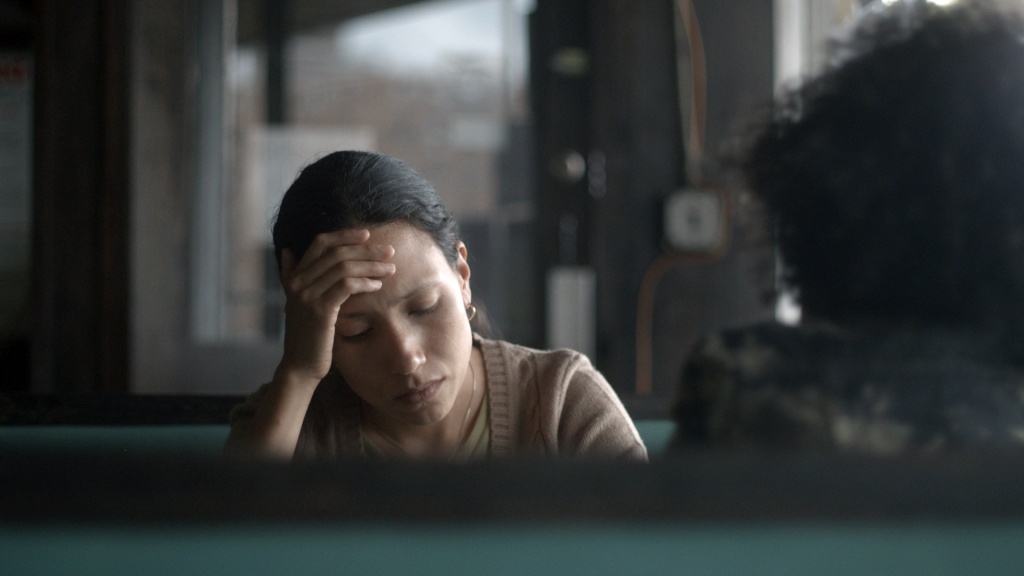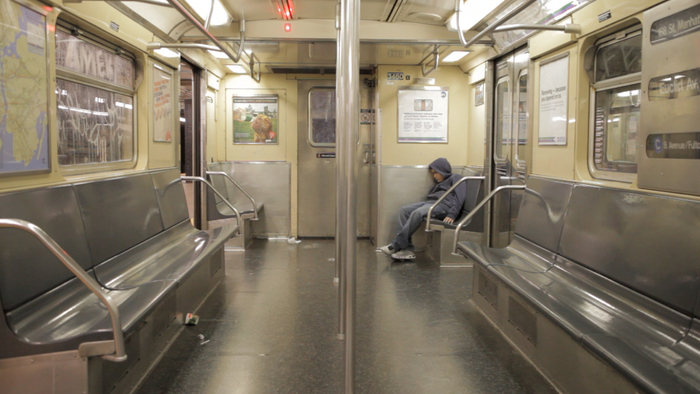By Christopher Bourne
Sam Fleischner’s revelatory, sensitively observed, and beautifully shot feature “Stand Clear of the Closing Doors” is a quintessentially New York film, capturing the sights and sounds of the city in a truly unique way and from an unusual perspective. Combining documentary-like realism with lyrically impressionistic visuals, the film is a passionately artful rendering of life in the city.
The central characters exist on the isolated margins of society. Mariana (Andrea Suarez Paz) is a Mexican undocumented immigrant who works as a house cleaner, and usually gets home long after her two kids are home from school. Her son Ricky (Jesus Sanchez-Velez) is autistic, bright in many ways and quite imaginative, but he is isolated from his classmates at school, and requires assistance for the most basic of bodily functions: he has to be told when to eat, and often pees on the toilet seat without lifting the lid, to the consternation and annoyance of his sister, who ends up having to clean up after him. Ricky’s older sister Carla (Azul Zorrilla) often regards her brother as a burden and an exasperating obstacle to being able to hang with her friends and to do the normal things a girl her age does. Ricky does prove himself useful around the house in key ways, however; he’s the one who remembers to feed the fish, and he’s handy at restoring the internet when it goes down.
Mariana mostly has to raise her kids alone, since their father Ricardo Sr. (Tenoch Huerta Mejia) is often away on construction jobs and very seldom comes home to visit. Mariana also gets very little help from the school system; when she is called in because Ricky’s been skipping school, she’s told by a school official that he should be taken out of regular public school and placed in a school for special needs kids, since no one on staff has the expertise to handle autistic children like Ricky. This deeply upsets Mariana, both because she feels he’s capable enough to be in a regular school, and also because placing him in a special school will require financial contributions on her part that she can ill afford.
The crisis of the film is set into motion when Carla fails to pick Ricky up from school one day, and Ricky, after being scolded by his mother on the phone for skipping school, hangs up on her and starts wandering around. Mesmerized by a dragon illustration on the back of a stranger’s jacket, Ricky follows the drawing into the subway, and soon Ricky is lost in the bewildering maze of the subway system.
Mariana, after realizing Ricky is missing, frantically searches for him, along the way befriending a shoe store owner (Marsha Stephanie Blake) who knows Ricky, since the boy would often visit the store, fascinated by sneaker designs. Mariana is initially loath to contact the police for fear that the authorities will begin nosing into her immigration status. Ricardo Sr. also returns from his job to join in the search, as the family strains resulting from their marginalized immigration and societal status are exposed by Ricky’s disappearance.
As Ricky travels on trains and walks through stations, his former isolation gives way to being forced to interact with the masses of humanity around him. While there is some cruelty – a teenager pours water on Ricky’s head after Ricky urinates in his seat after failing to find an unlocked toilet – there are some acts of kindness, such as a man giving the hungry boy a banana. The film beautifully captures the sights and sounds of the New York subway, lending a poetic sense of beauty to what regular riders have become numb to and regard as utterly mundane: the lights of train headlights and tunnel signals; acrobatic train dancers; underground preachers; Chinese erhu players; and random snatches of conversations among commuters.
Interestingly, both Ricky and Mariana go through similar trajectories of being forced out of their previous isolated existences, Ricky through his encounters with strangers on the subway, and Mariana having to reach out to the larger community, including the police, to help find her missing child. This paralleling of the similarly marginalized and misunderstood experiences of undocumented immigrants and the developmentally challenged is perhaps the film’s most intriguing concept.
“Stand Clear of the Closing Doors” also benefits greatly from a real-life event that not only impacted the film’s production, but completely transformed its concept and execution: the 2012 arrival of Hurricane Sandy. The film’s setting, which serves as Mariana and her family’s home, is Rockaway Beach, Queens, an area especially hard hit by the storm. (Fleischner himself was a resident, and lost his own home to Sandy.) The film includes shots of newspaper headlines referring to Sandy, as well as haunting images of post-Sandy destruction. The impending storm also lends urgency to the film’s plot, as the normal dangers to Ricky, an autistic child without guidance or his medication, wandering the subway by himself, are compounded by the impending storm. And even though the circumstances are very different, it’s difficult to watch this film now without reflecting on the real-life tragic fate of 14-year old Avonte Oquendo, another child with autism who disappeared from his school. In the film, Mariana and Carmen create and distribute missing-person flyers for Ricky, and this act recalls the months-long ubiquity in the subways and elsewhere of Oquendo’s missing-person posters.
These real-life touchstones only confirm Sam Fleischner’s great success in turning the real-life fabric of New York City into lyrical, often expressionist art which nevertheless doesn’t shy away from the hard-edged human struggles that are also a part of this city. This, among its other myriad brilliant qualities, makes “Stand Clear of the Closing Doors” a beautifully made and eminently memorable experience.
“Stand Clear of the Closing Doors” is now playing at the Cinema Village and will be released in VOD this summer.



Leave a Reply